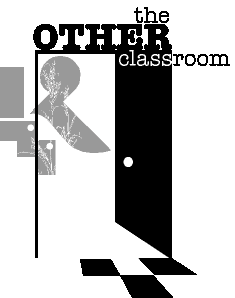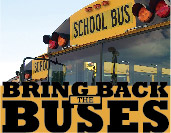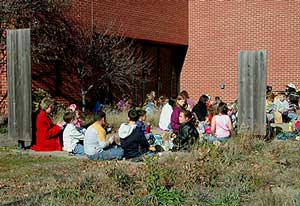| ---Back |

General guidelines
• cost $1.00 per student and adult; bus drivers free
• reservations required; at least two weeks in advance
• closed Mondays
• maximum group size = 60 students (call regarding arrangements for larger groups)
• choose 1, 2 or 3 programs and divide group; groups rotate through programs
• programs vary in length and should be paired with similar length programs
• minimum of one adult per rotation group required
• plan your visit during or after your field trip topics have been studied in class
• inform museum staff when special needs students have been integrated
Additional options (prior arrangements encouraged)
• groups third grade and older may visit the Museum Store; estimate one minute
per student, i.e. 30 students = 30 minutes
• look around on your own after the program; minimum one adult per ten students
• teachers or administrators may apply for transportation reimbursement through the Bring Back the Buses program, more information at
www.bethelks.edu/kauffman/education/bringbackthebuses
State Curricular Standards
Listed below each field trip program description are Kansas State Department of Education standards covered during the program.
Prairie Animals grade K-6, maximum 20 per rotation, 30 minutes
Using exhibit specimens, students identify prairie animals and discuss their characteristics, adaptations for survival, and interaction with the prairie environment. This program introduces the prairie food chain with an emphasis on the relationship between predators and prey and includes hands-on study of bones and pelts.
Next Generation Science Standards
• Grades 1, 4 Structure, Function and Information Processing
• Grades K, 2-3 Interdependent Relationships in Ecosystems: Animals, Plants and Their Environments
• Grade 3 Inheritance and Variation of Traits: Life Cycles and Traits
• Grade 5 Matter and Energy in Organisms and Ecosystems
The Kansas Tallgrass Prairie grade K-6, maximum 15 per rotation, 30 minutes
offered June through December
In the Museum's 1 1/2 acre reconstructed prairie, students examine a variety of native prairie grasses and forbs (non-grass plants such as wildflowers) and discuss characteristics of the dynamic prairie ecosystem.
Next Generation Science Standards
• Grades 1, 4 Structure, Function and Information Processing
• Grades K, 2-3 Interdependent Relationships in Ecosystems: Animals, Plants and Their Environments
• Grade 3 Inheritance and Variation of Traits: Life Cycles and Traits
• Grade 4 Energy
• Grade 5 Matter and Energy in Organisms and Ecosystems
Measuring Up, Down and All Around grade 3-5, maximum 24 per rotation, 45 minutes
Working in small groups students choose appropriate tools to measure features of a variety of museum artifacts.
Kansas College and Career Ready Standards for Mathematics
• Grade 2 Measurement and Data: Measure and estimate lengths in standard units
• Grade 2 Geometry: Reason with shapes and their attributes
• Grade 3 Measurement and Data: Understand concepts of area and relate area to multiplication and to addition
• Grade 3 Measurement and Data: Recognize perimeter as an attribute of plane figures and distinguish between linear and area measures
• Grade 4 Measurement and Data: Solve problems involving measurement and conversion of measurements from a larger unit to a smaller unit
Meet the Beak grade 3-5, maximum 24 per rotation, 45 minutes
Students compare the structure and function of bird beaks by observing museum specimens, doing a worksheet and playing a bird beak game. Schedule with Locomotion Notion.
Next Generation Science Standards
• Grade 3 Interdependent Relationships in Ecosystems
• Grade 3 Inheritance and Variation of Traits: Life Cycles and Traits
• Grade 4 Structure, Function and Information Processing
Locomotion Notion grade 3-5, maximum 24 per rotation, 45 minutes
Students compare the structure and function of movement in a variety of prairie animals and compare those movements to human movement. Schedule with Meet the Beak.
Next Generation Science Standards
• Grade 3 Inheritance and Variation of Traits: Life Cycles and Traits
• Grade 4 Structure, Function and Information Processing
Immigrants to the Prairie grade K-6, maximum 20 per rotation, 30-45 minutes
Students learn what life was like for German-Russian immigrants moving from their homes in Russia to the Kansas prairie. An authentic 1870s pioneer log cabin inside the Museum is included.
Kansas Standards for History, Government and Social Studies
• Grade 1 Families
• Grade 2 Then and Now
• Grade 3 Community
• Grade 4 Kansas and Regions of the United States
Plains Indians grade 1-6, maximum 15 per rotation, 30-45 minutes
Students learn about the clothing, food, recreation and ceremonial life of Native Americans through artifacts in the Museum's Original People exhibit.
Kansas Standards for History, Government and Social Studies
• Grade 1 Families
• Grade 2 Then and Now
• Grade 4 Kansas and Regions of the United States
• Grade 5 A New Nation
Farmstead on the Prairie grade K-6, maximum 20 per rotation, 30-45 minutes
Students explore the lifestyle of a farm family in the 1880s and compare it with that of a contemporary rural or urban family. Includes the farmstead house and/or the barn.
Kansas Standards for History, Government and Social Studies
• Grade 1 Families
• Grade 2 Then and Now
• Grade 3 Community
Next Generation Science Standards
• Grades K-2 Engineering Design
• Grade 4 Energy
Old-fashioned Toys grade K-3, maximum 15 per rotation, 30 minutes
Students compare and contrast toys and recreational activities from the past to those of today. If time and circumstances allow, students will play with toys of the past.
Kansas Standards for History, Government and Social Studies
• Grade K Sense of Self
• Grade 1 Families
• Grade 2 Then and Now
Next Generation Science Standards
• Grade K Forces and Interactions, Pushes, and Pulls
• Grade 2 Structure and Properties of Matter
Cultural Contrasts grade 4-6, maximum 10 per rotation, 30-45 minutes
Students compare dress, food, and religious and social customs of cultures through the study of exhibits about Africa, India and China.
Kansas Standards for History, Government and Social Studies
• Grade 6 Ancient World History




